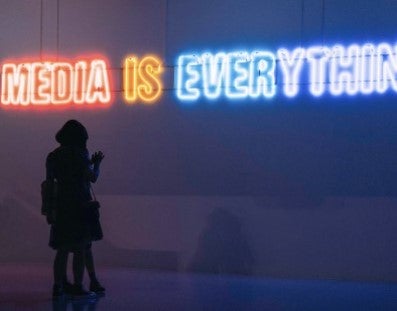This master’s programme equips students with the tools to navigate the complex technological and aesthetic relationships between media, art, and the environment. This combination, together with our approach to spectatorship, eco-media, and museology, is unique in the Netherlands. Through historical, theoretical and analytical research, you will explore such diverse themes as: materialities of media, cross-media spaces and practices of exhibition and archiving, as well as time, sensing and aesthetics.
Sharp eye
During your studies in the Comparative Arts and Media Studies programme, you will develop a sharp eye (and ear) for a wide range of media and art objects and processes. You will also learn to analyse and place them in their various contexts. You will attain academic skills such as critical thinking, presentation and writing skills.
Learning to conduct research on a variety of topics, both in academia and in the world at large, is another essential component of the programme. In addition to developing a solid understanding of the cultural landscape, you will learn to think, speak and write about relevant topics at a highly advanced level.
Amsterdam
Studying in the city of Amsterdam is a unique experience. The urban setting and the multicultural mindset of the people of Amsterdam, combined with the energy of a thriving cultural city life provide a vibrant and diverse environment for your education. The larger Amsterdam region is home to several internationally renowned institutions that house some of the most significant art and media collections. Among them are the Rijksmuseum, the Eye Filmmuseum, the Stedelijk Museum and the Netherlands Institute for Sound and Vision in Hilversum, as well as political and cultural citizen initiatives such as The Black Archives.
Cultural collaboration
There are many opportunities for collaboration with cultural institutions in Amsterdam and beyond. Our wide-ranging academic courses often include research trips to museums and archives or visits from artists and cultural entrepreneurs, which allow you to explore the collaborative possibilities to their fullest and put your knowledge into practice in unique and exciting ways.
